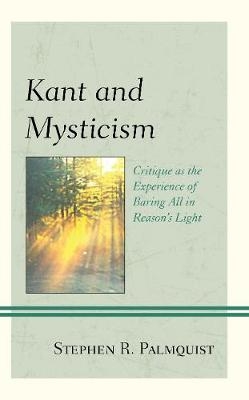
Kant and Mysticism
Lexington Books (Verlag)
978-1-7936-0466-8 (ISBN)
What is happening when someone has a mystical experience, such as “feeling at one with the universe” or “hearing God’s voice?” Does philosophy provide tools for assessing such claims? Which claims can be dismissed as delusions and which ones convey genuine truths that might be universally meaningful? Valuable insights into such pressing questions can be found in the writings of Immanuel Kant, though few philosophical commentators have appreciated the implications beyond his famous “Copernican hypothesis.” In Kant and Mysticism, Stephen R. Palmquist corrects this skewed view of Kant once and for all.
Beginning with a detailed analysis of Kant’s 1766 work Dreams of a Spirit-Seer, Palmquist demonstrates that in Dreams Kant first discovers and explains his plan to write a new, “critical” philosophy that will revolutionize metaphysics by laying bare the limits of human reason. Palmquist shows how the same metaphorical relationship—between reason’s dreams (metaphysics) and sensibility’s dreams (mysticism)—permeates Kant’s mature writings. Clarifying how Kant’s final (unfinished) book, Opus Postumum, completes this dual project, Palmquist explains how the “critical mysticism” entailed by Kant’s position has profound implications for contemporary understandings of religious and mystical experience, both by religious individuals and by philosophers seeking to understand such experiences.
Stephen R. Palmquist is professor of religion and philosophy at Hong Kong Baptist University.
Preface
Introduction: The Problem of Mystical Experience in Kant
Part I
Swedenborg’s Influence on Kant’s Critical Awakening
Chapter 1 — The Copernican Hypothesis as the Key to Kant’s Awakening from Dogmatic Slumber
Chapter 2 — The Impact of Swedenborg’s Mysticism on Kant’s Metaphysical Dreams
Chapter 3 — Kant’s Awakening: The Copernican Hypothesis as the Key to Critical Mysticism
Chapter 4 — Kant’s Metaphysical Dream: A System of Critical Philosophy
Part II
Kant’s Critical Philosophy as a Critique of Mysticism
Chapter 5 — Does Mystical Experience Always Prompt Delirium?
Chapter 6 — Kant’s Critique of Delirious Mysticism
Chapter 7 — Critical Mysticism as Immediate Experience of the Moral
Chapter 8 — Key Metaphors Guiding Kant’s Critical Mysticism
Part III
The Opus Postumum as an Experiment in Critical Mysticism
Chapter 9 — Can the Original (Threefold) Synthesis Be Consciously Experienced?
Chapter 10 — The Categorical Imperative as the Voice of God
Chapter 11 — Matter’s Living Force as Immediate Experience of the World
Chapter 12 — The Highest Purpose of Philosophy as Exhibiting the God–Man
Conclusion — Kantian Mysticism for the Twenty-First Century
| Erscheinungsdatum | 09.03.2022 |
|---|---|
| Reihe/Serie | Contemporary Studies in Idealism |
| Verlagsort | Lanham, MD |
| Sprache | englisch |
| Maße | 154 x 230 mm |
| Gewicht | 281 g |
| Themenwelt | Geisteswissenschaften ► Philosophie ► Geschichte der Philosophie |
| Geisteswissenschaften ► Philosophie ► Philosophie der Neuzeit | |
| Geisteswissenschaften ► Religion / Theologie | |
| ISBN-10 | 1-7936-0466-5 / 1793604665 |
| ISBN-13 | 978-1-7936-0466-8 / 9781793604668 |
| Zustand | Neuware |
| Haben Sie eine Frage zum Produkt? |
aus dem Bereich


